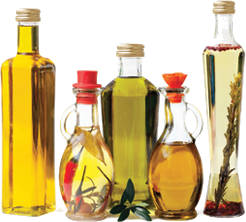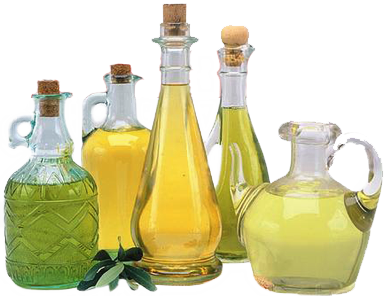
|
|
Types of oils Natural fats contain varying ratios of four types of fats: saturated, monounsaturated, polyunsaturated and trans fat. Saturated fats are solid at room temperature and very stable. They resist oxidation, so they often can tolerate higher temperatures. Increases overall cholesterol levels, specifically LDL or "bad" cholesterol Found in animal-based foods such as meat, poultry and eggs, and also in butter, cream and other dairy products Polyunsaturated fats are liquid at room temperature and generally the least stable for cooking. They oxidize easily and are found in safflower and sunflower oils, if not labeled for high heat or "high oleic. Reduces overall cholesterol levels, and specifically LDL or "bad" cholesterol Monounsaturated fats also are liquid at room temperature and generally are more stable than polyunsaturates. They're found in canola, nuts and olives. Reduces overall cholesterol levels, and specifically LDL or "bad" cholesterol, while increasing levels of HDL or "good" cholesterol Trans Fat: Another "bad" fat. Trans fats can be found naturally in some foods, such as those from animals, including meat and dairy products. Artificial trans fats can be formed when oil goes through a process called hydrogenation, which hardens the oil. This type of fat, known as hydrogenated fat, can be used for frying or as an ingredient in processed foods. Much smaller amounts of artificial trans fats can also be made when oils are refined to make them fit to eat. Increases levels of LDL or "bad" cholesterol and lowers levels of HDL or "good" cholesterol Found in hydrogenated fat products such as margarines and vegetable shortenings. Used in packaged snack foods such as cookies, crackers and chips, and in fried foods from fast-food and other restaurants Pressed vs. chemically extracted PCC buyers seek out culinary oils that are mechanically pressed from the seed without using chemical solvents. These also are referred to as "expeller pressed." Olive, avocado and walnut oils, for example, are from soft fruit or nuts that need only expeller pressing and centrifuging. They may be labeled "cold-pressed." Hard oilseeds, such as soy or canola, usually require some pre-treatment such as steam before pressing but the brands at PCC still do not rely on chemical solvents. In contrast, mass-market oils generally are extracted with toxic solvents such as hexane. These oils then undergo harsh treatment to remove the solvent. More chemicals, very high heat, and straining are used to deodorize and bleach the oils — rendering them inferior in taste, fragrance, appearance and especially nutritional quality. Unrefined oils Unrefined oils are filtered only lightly to remove large particles. Some, such as sesame or olive oil, may appear cloudy or have visible sediment after sitting. This does not compromise quality. Unrefined oils have more pronounced flavors, colors and fragrances than refined oils. Like unrefined whole grain flours, unrefined oils are more nutritious and have a shorter storage life than refined. Unrefined oils are best used unheated in dressings or with low heat sautéing or baking. Their natural resins and other beneficial particles burn easily and develop unpleasant flavors and unhealthful properties if overheated. If you choose to bake with unrefined oils, expect the flavour to be more pronounced. Refined oils Naturally refined oils are more thoroughly filtered and strained than unrefined, usually with some additional heat but without harsh or damaging chemicals. Refining reduces the nutrient level and flavour. It also removes particles and resins and makes naturally refined oils more stable for longer storage, more resistant to smoking, and a good choice for high-heat cooking and frying. Refined oils recommended for high-heat cooking and deep-frying are "high oleic" safflower, sunflower, and peanut oil. These oils are from varieties high in monounsaturated fats, which are well-suited for high heat. |
||||||||||||||||||||||||||||||||||||||||||||||||||||||||||||||||||||||||||||||||||||||||||||||||||||||||||||||||||||||||||||||||||||||||||||||||||||||||||||||||||||||||||||||||||||||||||||||||||||||
|
|
Main Menu |
|
|
|
|
|
|
14/07/2025 © Veggiefood

